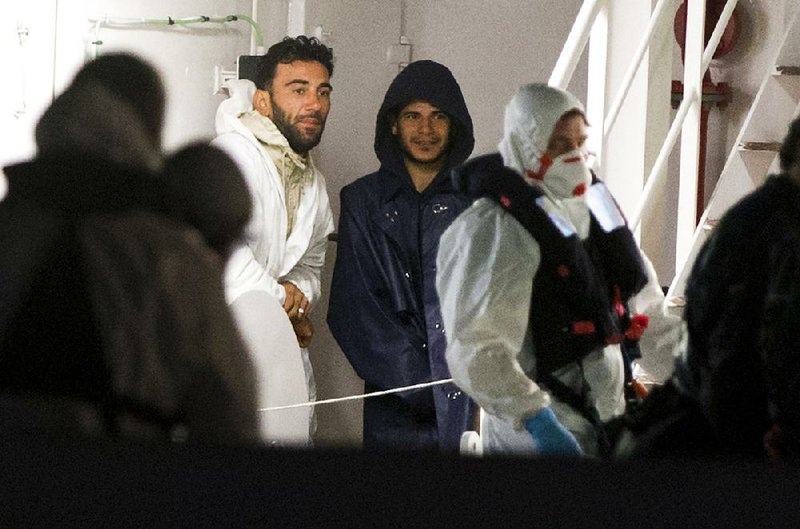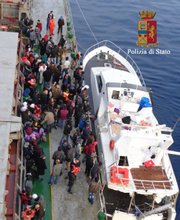CATANIA, Sicily -- The United Nations refugee agency said Tuesday that more than 800 people were believed to have drowned in the weekend sinking of a boat trying to reach Europe, making it the deadliest such disaster in the Mediterranean.
New details of the disaster emerged as the U.N. High Commissioner for Refugees and other aid agencies interviewed some of the 28 survivors who arrived overnight in Catania, Sicily.
Survivors put the number of passengers on board the three-deck fishing trawler at 850, commissioner's spokesman Adrian Edwards said in Geneva. Only 24 bodies had been recovered.
"From available information and the various accounts we've had, UNHCR now believes the number of fatalities to have been over 800, making this the deadliest incident in the Mediterranean that we have recorded," Edwards said.
Prosecutors in Catania said a special email address had been set up for relatives, friends and acquaintances of the victims in hopes of determining who was on board. Still, they acknowledged the exact death toll may never be known.
"No facts have emerged that can be helpful to determine in a more precise way the number of dead," prosecutors said in a statement.
Thousands of people fleeing conflicts or poverty across the Middle East and Africa head to Italy each year on smugglers' boats setting sail from Libya.
So far this year, 1,776 people have died on such voyages in the Mediterranean, according to the U.N. refugee agency, which estimates that 219,000 people made the crossing in 2014.
The International Organization for Migration said the number of deaths so far this year is 30 times higher than at this point in 2014. A total of 3,279 people died last year, it said. That was much higher than in 2013, when around 700 people died, the agency said.
The 2015 death toll "could well top 30,000," said Joel Millman, a spokesman for the organization. "We just want to make sure people understand how much more ... rapid these deaths have been coming this year than last year."
Among the arrivals overnight were two suspected smugglers, who were immediately detained.
The captain, identified Tuesday by prosecutors as Mohammed Ali Malek, 27, a Tunisian, was arrested on suspicion of multiple homicide. He and another crew member, Mahmud Bikhit, 25, a Syrian, also are likely to be charged with engaging in illegal migration, authorities said.
Survivors told aid workers the wreck was caused when one of the smugglers crashed the boat against the Portuguese-flagged King Jacob container ship that had responded to a distress call, U.N. commissioner's spokesman Carlotta Sami said.
"The survivors said that the person who was steering the boat, their smuggler, was navigating badly, and he did a bad move that made it crash against the bigger ship," Sami said by telephone from Sicily.
Prosecutors said that after the trawler's captain rammed the Portuguese vessel, terrified people rushed to one side of the overcrowded boat, which already was unbalanced from the collision. The trawler pitched in the water before finally tipping over and sinking.
Catania prosecutor Giovanni Salvi on Tuesday backtracked on an earlier statement that the container ship's inexperience had contributed to the disaster, stressing that crew members had done their job. Sami praised the Portuguese ship, which had previous experience in a handful of similar rescue attempts.
Most of the people on board the trawler couldn't escape because they were locked below deck on the trawler's lower two levels, prosecutors said, while hundreds more were squeezed on the upper deck. Their mistreatment began before they set foot aboard the boat on the night of April 16, prosecutors said in a statement, citing survivor accounts.
The people had been held for as long as 30 days on a farm near where the boat was docked before being transported in groups of about 30 in trucks to the embarking point, it said.
"In one instance, one of the migrants was allegedly struck with a club because he stepped away" to go to the bathroom, the statement said.
Nearly all the people were from African countries, including Mali, Gambia, Senegal, Sierra Leone, Ivory Coast, Eritrea and Somalia, as well as some from Bangladesh. A Bangladeshi survivor, airlifted Sunday from the wreckage site to Sicily, gave prosecutors the first account of the episode.
The survivors of the weekend disaster were taken Tuesday to a holding center in Catania and were "very tired, very shocked, silent," according to Flavio Di Giacomo of the International Organization for Migration.
Sami said all the survivors were men, several of them adolescents. "They are very confused, fragile and scared," she said.
Call to action
The weekend deaths have jolted the European Union into trying to come up with a plan to address the crisis, with Italy demanding that it not be left alone to shoulder the burden of rescues and asking the EU to focus on preventing the boats from leaving Libya.
Combating the smugglers by arresting the ringleaders and destroying their boats is emerging as a key part of Europe's 10-point proposal for an emergency summit in Brussels on Thursday. Italy has arrested more than 1,000 smugglers, most of them the boats' navigators and not the masterminds.
Rising numbers have been trying to reach Europe as the weather improves, often traveling in rickety boats.
The coast guard reported that it saved 638 other travelers in six different rescue operations Monday. On Tuesday, a further 446 people were rescued from a leaking ship about 80 miles south of the Calabrian coast.
The smugglers use a variety of boats for their crossings, including rubber Zodiac-type boats, wooden fishing vessels and old cargo ships. They are almost always overcrowded to maximize the revenue of the smugglers, who charge $1,000 or more for the crossing from Libya, where most trafficking operations originate.
But not all those turning to smugglers to escape conflict or violence are risking their lives in unseaworthy boats.
Police in Ragusa, a Sicilian port town, said they arrested three Syrians connected to a Turkish-flagged luxury yacht that charged passengers $8,500 for the trip from Turkey to Sicily. Among the Syrian and Palestinian passengers were 23 children.
Photos snapped by passengers helped police identify the smugglers, police said in a statement. They estimated that the organizers were paid some $800,000 in total for the trip.
The EU plan calls for closer law enforcement coordination to trace smugglers' revenue sources, which prosecutors have said often evade traditional bank transfers in favor of informal networks, in which the travelers' relatives in Europe pay local brokers for each leg of the journey.
Italy had launched a robust and expensive search-and-rescue mission in 2013 after some 366 people drowned off the island of Lampedusa. The politically unpopular Mare Nostrum operation ended last year, and the EU's Frontex border patrol mission took charge.
The EU mission's limited mandate and resources have prevented it from being effective in saving lives.
While the EU has sought to harmonize its asylum policy, in practice, there is a patchwork of approaches. That has engendered so-called asylum shopping, by which foreigners head to countries where they believe they are more likely to gain entry and refuge.
Managing the EU's borders became more challenging after the bloc expanded to the east in May 2004, creating an even larger area for people from the Middle East and Africa to enter. The right of EU citizens to move freely across the union's internal borders also has also made it easier for foreigners to fall through the cracks.
All the while, instability from Syria to Libya to Ukraine has made Europe ever more attractive for desperate people seeking a better life.
A spokesman for Libya's internationally recognized government said Tuesday that the country's chaos has spurred an increase in human trafficking, urging the world community to help his administration gain control of the rest of the country.
Libya has two rival governments, each claiming legitimacy as their allied militias fight across the country. The smuggling of people to Europe via Libya generates large amounts of illicit money, some of which ends up in the hands of militant groups, Hatem al-Aribi said.
"There are those who are using Libya as a safe passage in the current situation, especially given the inability to secure the entire Libyan territory," al-Aribi said. "The amount of money involved in this trade is huge, and we have intelligence that some of this money goes to terrorist organizations."
Yves Pascouau, the director of migration policy at the European Policy Center in Brussels, noted that a lack of political will in some European states to help foreigners -- fanned by the anti-immigrant sentiment of the far right and strong unemployment -- had helped exacerbate the trafficking crisis.
"The EU has been struggling to respond to the crisis because governments think it is too expensive," he said, noting that this was happening against a backdrop where "the debate on immigration has become toxic because of the rise of the far right."
Information for this article was contributed by Trisha Thomas, Colleen Barry, Frank Jordans, Nicole Winfield, Frances D'Emilio and staff members of The Associated Press and by Jim Yardley, Dan Bilefsky, Gaia Pianigiani and Nick Cumming-Bruce of The New York Times.
A Section on 04/22/2015



